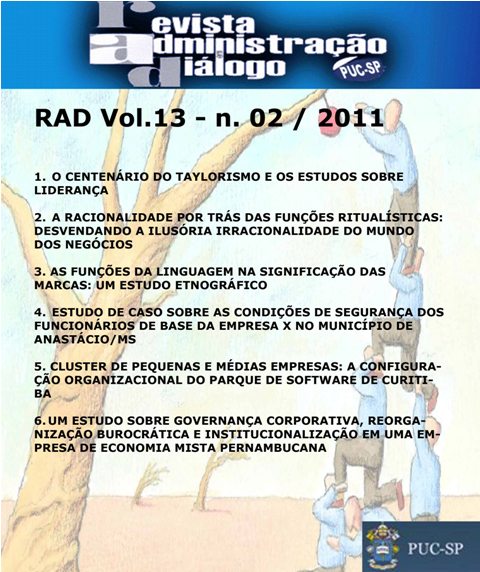A RACIONALIDADE POR TRÁS DAS FUNÇÕES RITUALÍSTICAS: DESVENDANDO A ILUSÓRIA IRRACIONALIDADE DO MUNDO DOS NEGÓCIOS
DOI:
https://doi.org/10.20946/rad.v13i2.5560Abstract
Partindo da percepção de que nas organizações existem diversas ações, políticas e condutas que, ao menos aparentemente, podem ser interpretadas como irracionais, o presente artigo teve por objetivo discutir qual seria a lógica por trás de tais atos. Neste sentido, foram abarcadas as contribuições teóricas oferecidas pela Teoria da Ação de Parsons, juntamente com a teoria Institucional e Neo-Institucional. Além disso, foi realizada uma breve discussão acerca dos conceitos de Racionalidade Instrumental e Substantiva. A partir das análises, frente à opção teórica delineada, pode perceber que na essência de tais atos, aparentemente irracionais, reside uma lógica calcada em avaliações e interpretações racionais, desde que devidamente analisadas a partir das especificidades de seus contextos. Dessa forma, ao rotular como irracional os altos custos assumidos pelas organizações, para a participação de seus funcionários em “eventos espetaculares” cultuados pelo mainstream, ou despesas com cursos de MBA´s, que muitas vezes não representam o retorno de conhecimento esperado, tais atos são plenamente racionais uma vez que visa consolidar sua legitimidade, elevar o consenso entre seus atores internos e externos, e assegurar a sobrevivência da organização.Metrics
Downloads
Published
How to Cite
Issue
Section
License
Authors who publish in this journal agree to the following terms:
1. Authors retain the copyright and grant the journal the right of first publication, with the work licensed simultaneously under a Creative Commons Attribution License after publication, allowing the sharing of work with acknowledgment of the authorship of the work and initial publication in this journal.
2. Authors are authorized to take additional contracts separately, for non-exclusive distribution of the version of the work published in this journal (eg publish in institutional repository or as a book chapter), with acknowledgment of authorship and initial publication in this journal.
3. Authors are allowed and encouraged to publish and distribute their work online (eg in institutional repositories or on their personal page) at any point before or during the editorial process, as this can generate productive changes, as well as increase the and the citation of the published work (See The Effect of Free Access).








